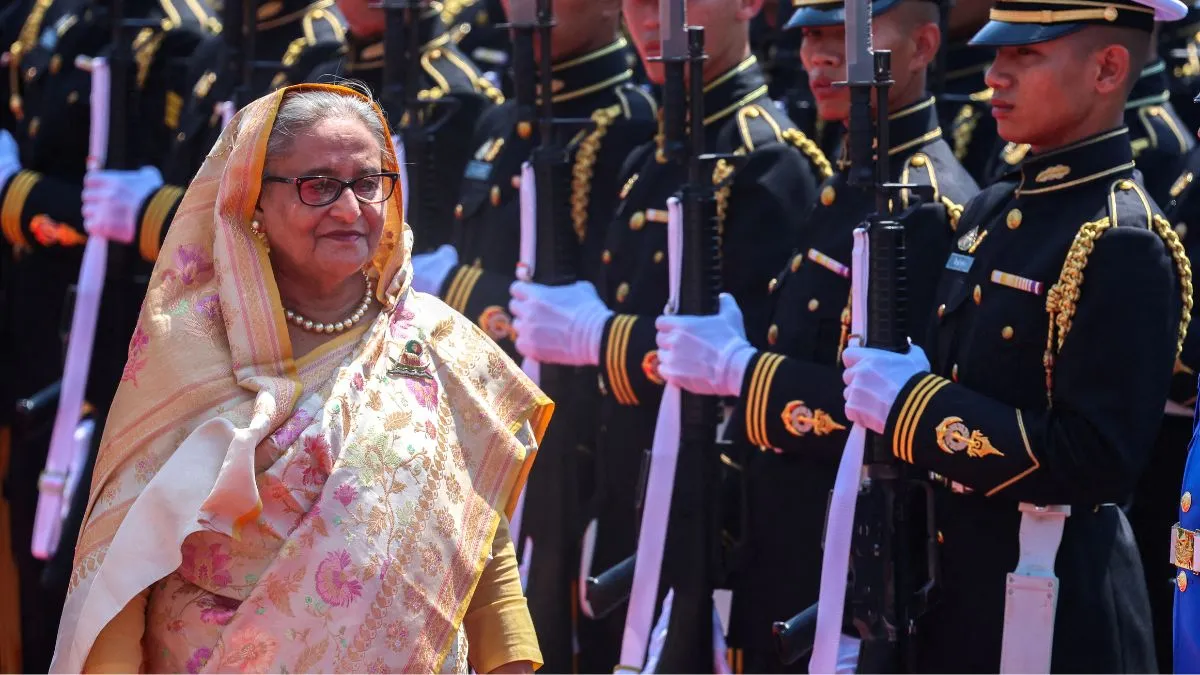- By Talibuddin Khan
- Wed, 08 Jan 2025 02:55 PM (IST)
- Source:JND
Bangladesh News: A day after Mohammad Yunus-led Bangladesh's interim government revoked the passport of exiled prime minister Sheikh Hasina and 96 others, India has reportedly extended the visa provided to her. Hasina has been living in India since August 5 last year, when she fled Bangladesh following a massive student-led protest that toppled her Awami League's (AL) 16-year regime.
According to a report by Hindustan Times, quoting people familiar with the development, the extension has been provided to facilitate her stay in the country, which will be deemed illegal if her visa ends. However, the report further stated that Hasina has not been granted asylum in India as of now and no discussions are underway to provide her asylum in the country.
The report further mentioned that the Union Home Ministry, the concerned authority to deal with such matters, has extended her visa and was done through the local Foreigners Regional Registration Office (FRRO). The visa extension was provided amid the growing calls to extradite the former PM from India. Bangladesh had sought her extradition through a note verbale, or unsigned diplomatic correspondence, sent to the external affairs ministry on December 23.
The development came a day after Bangladesh's passports department revoked Sheikh Hasina's passport along with 96 others over their alleged involvement in enforced disappearances and the July killings. "The Passports Department cancelled passports of 22 people involved in enforced disappearances, while passports of 75 people, including Sheikh Hasina, were revoked due to their involvement in the July killings,” Chief Adviser's Deputy Press Secretary Abul Kalam Azad Majumder said as quoted by PTI.
Meanwhile, Bangladesh's International Crimes Tribunal (ICT) has again issued arrest warrants for Hasina and several former Cabinet ministers, advisers, and military and civil officials for "crimes against humanity and genocide". The warrants relate to two cases involving allegations of extrajudicial killings and enforced disappearances.
In its directive, the tribunal has ordered the authorities to arrest and produce Sheikh Hasina and the others before it by February 12, The Daily Star reported. Hasina is currently facing multiple court cases related to fatalities during her rule, including accusations of crimes against humanity.
ALSO READ: 'Anna University Sexual Assault Accused Not Member Of DMK But...': Tamil Nadu CM MK Stalin
However, according to Vikas Singh, former Additional Solicitor General of India, Hasina has several protections against extradition. "India cannot extradite individuals accused of political crimes and the punishment in the requesting country (Bangladesh) must not exceed that prescribed in India for similar offences," Singh said, as quoted by ANI.
"The International Criminal Tribunal is a tribunal set up in Bangladesh on the basis of a domestic law of Bangladesh where they recognise certain international crimes and this arrest warrant is by a domestic court of Bangladesh. For that arrest warrant to be made effective, there will have to be an extradition from India. It is only after extradition from India that this warrant can be made effective," he said.
To make the arrest warrant effective, Bangladesh will need to request extradition from India. This process involves moving an Indian court, which may be challenging given the protections in place.
"For extradition, the particular offender has several protections. One of them is that for a political crime, you can't be extradited. The other protection is that the punishment in the country which is seeking extradition should not be higher than that provided for a similar offence in India. So, considering all these safeguards and all the other safeguards that they have, they will have to move an Indian court to get the extradition. It is doubtful whether an extradition can be granted under these circumstances," Singh added.
(With Agencies Inputs)

